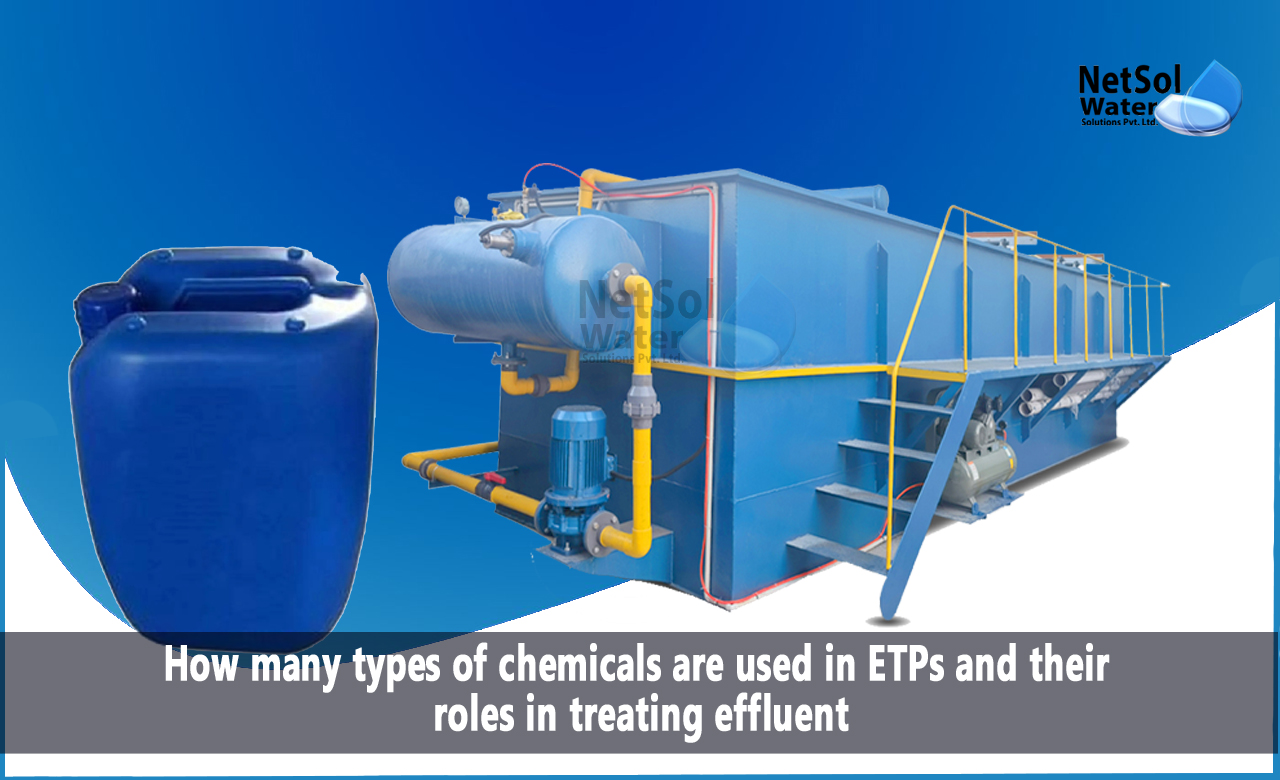How many types of chemicals are used in ETPs?
Effluent treatment plants (ETPs) play a vital role in removing pollutants from wastewater before it is discharged into the environment. Chemicals are an essential component of ETPs as they help in the treatment process.
In this blog, we will discuss the different types of chemicals used in ETPs and their roles in treating effluent.
Types of Chemicals Used in ETPs
- Coagulants: Coagulants are chemicals that help in the formation of flocs, which trap suspended solids and organic matter. The most commonly used coagulants in ETPs are alum, ferric chloride, and Polyaluminum chloride. These chemicals neutralize the negative charges on suspended solids, which allows them to clump together and settle out of the water.
- Flocculants: Flocculants are used to promote the formation of larger flocs that settle out of the water more quickly. The most commonly used flocculants in ETPs are polyacrylamides, which help to bridge the gaps between particles, allowing them to clump together more effectively.
- pH Adjusting Chemicals: The pH of the wastewater can have a significant impact on the treatment process. pH adjusting chemicals, such as sulfuric acid or sodium hydroxide, are used to adjust the pH of the wastewater to a level that is conducive to the treatment process. Typically, pH levels between 6 and 8 are optimal for the treatment process.
- Oxidizing Agents: Oxidizing agents, such as chlorine or hydrogen peroxide, are used to break down organic matter in the wastewater. These chemicals react with organic matter, breaking it down into simpler compounds that can be more easily treated.
- Reducing Agents: Reducing agents, such as sodium bisulfite, are used to remove residual chlorine or other oxidizing agents from the wastewater before it is discharged into the environment. These chemicals react with the oxidizing agents, neutralizing them and making them less harmful.
Roles of Different Types of Chemicals in ETPs
- Coagulants: Coagulants play a crucial role in the initial stages of the treatment process. They neutralize the negative charges on suspended solids, allowing them to clump together and settle out of the water. This process is called coagulation, and it is essential for removing large particles from the wastewater.
- Flocculants: Flocculants play a critical role in the secondary stages of the treatment process. They promote the formation of larger flocs, which settle out of the water more quickly. This process is called flocculation, and it is essential for removing smaller particles from the wastewater.
- pH Adjusting Chemicals: pH adjusting chemicals play a crucial role in maintaining the optimal pH level for the treatment process. If the pH of the wastewater is too low or too high, it can interfere with the chemical reactions that occur during the treatment process. pH adjusting chemicals help to maintain the optimal pH level, ensuring that the treatment process is efficient.
- Oxidizing Agents: Oxidizing agents play a crucial role in breaking down organic matter in the wastewater. They react with organic matter, breaking it down into simpler compounds that can be more easily treated. This process is called oxidation, and it is essential for removing organic matter from the wastewater.
- Reducing Agents: Reducing agents play a critical role in removing residual chlorine or other oxidizing agents from the wastewater. These chemicals react with the oxidizing agents, neutralizing them and making them less harmful. This process is called reduction, and it is essential for ensuring that the discharged wastewater is safe for the environment.
Conclusion
In conclusion, chemicals play a vital role in the treatment process of effluent in ETPs. It is essential to choose the appropriate chemicals based on the characteristics of the wastewater being treated. The dosage of chemicals should also be carefully controlled to ensure that the treatment process is efficient and effective.
In addition to chemical treatment, other methods, such as biological treatment and membrane filtration, can also be used in ETPs to treat wastewater. These methods work in conjunction with chemical treatment to provide a comprehensive solution for treating effluent.
In conclusion, the treatment of effluent is a critical process for protecting the environment and public health. Chemicals are an essential component of ETPs, and their roles in the treatment process should not be underestimated. Proper selection and control of chemicals can ensure the efficient and effective treatment of wastewater, protecting the environment for generations to come.
For any other support, inquiries, or product purchases, call on +91-9650608473 or email at enquiry@netsolwater.com



